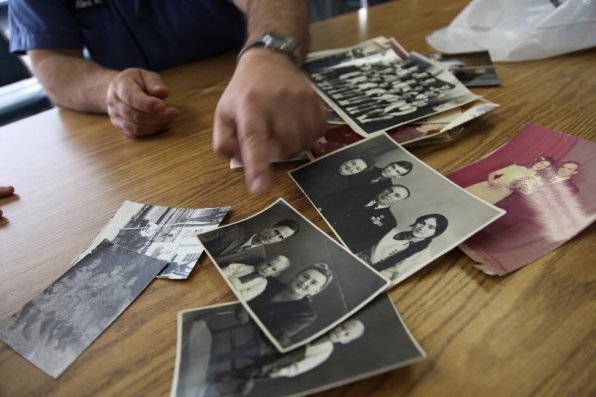Chances are, you don’t know Alexander Kotsekon. But if you live in Concord, you benefit from his work every day. It flows through your pipes, floats your goldfish and freezes in your ice cube trays. Kotsekon is Concord’s water treatment plant operator, which means he’s in charge of all the water that you probably take for granted. And, just as that water winds its way through the hidden pipes of Concord, Kotsekon’s path to the capital city was full of twists and turns.
Kotsekon was born in the then-Soviet state of Ukraine in 1955, but in a way, his journey had been under way for centuries. His family’s history leading up to his birth reads like something out of a Tolstoy novel. Kotsekon’s great-great-grandfather served in the Russian Army during the Great Turkish war at the end of the 17th century. While he was rescuing a group of Ukrainian girls taken prisoner by the Turks, one little lady caught his eye and they were married.
Cut to 1939. Kotsekon’s grandfather was a prominent, decorated Soviet citizen, chief of a big railway station. All seemed to be going well until, as seemed to happen to so many under Stalin’s regime, he was taken away by the secret police in the middle of the night with no explanation. He managed to sneak a note to his family off of his train to the gulag. The note read simply “save the kids.” That was the last his family heard of him until 1961, when the family received a note clearing him of “espionage for Japan” and relayed the sad news that he had died in custody in 1944.
Young talent
Kotsekon’s tale took another turn when his mother, then 16, was captured by Nazis and put work in a Dresden gunpowder factory. She slaved away, working 20-hour shifts until she was able to escape during the famous Dresden bombings. While working for the Russian Army as a typist, she met the man who would become her husband, and soon after, Kotsekon was born.
From an early age, he showed a proclivity for engineering.
“Maybe it was some type of reward to my mother,” Kotsekov said. “I was talented at an early age. I was reading and writing at 4 years old.”
Kotsekon translated that early education into high scores on many national exams, culminating in a national chemistry exam in which he placed third for all of Ukraine – enough to get him into the Institute of Chemical Technology in Moscow.
“The best brains in chemistry were concentrated there,” Kotsekon said.
Unlike at some American colleges, Russian students were actually expected to learn something practical during their schooling. Kotsekon majored in industrial liquid waste treatment and graduated with a 4.26 out of 5 GPA.
Another Russian college concept Americans would find foreign was that students were assigned a manual labor job upon graduation, regardless of their field of study. Kotsekon was assigned to work on a farm. This was the first time he laid his eyes on Tatyana, a lovely young electrochemist who was fortuitously assigned to work on the same farm as Kotsekon. The two were eventually married and had two children, Dennis and Dariya.
Professional life
Kotsekon took a job at a military electronic production plant under direct command from Moscow, making top-secret devices for the Russian Navy and space program. He worked there from 1978-91, working his way up to chief of chemical production. Kotsekon was offered a job at Chernobyl just one year before the plant explosion there. He turned it down because the government wouldn’t provide his family an apartment, which his previous job had done.
“I was lucky I was listening to my wife there,” Kotsekon said.
When the Soviet Union collapsed in 1991, Kotsekov knew it was time to refocus his life. He took his talents from the factory and applied them at city hall. Kotsekon served as a city councilor (or the Ukrainian equivalent) and helped elect the first non-Communist mayor in the history of the Ukraine. He worked to reform the perception of business and entrepreneurship in a country used to centuries of nothing but state-owned businesses.
Kotsekon opened a gas station and an engineering consulting firm but had a hard time dealing with shakedowns and racketeering from criminal organization.
“It was a time of uncertainty,” he said. “Reform did not go well.”
With his homeland freed from tyranny but still ultimately in turmoil, Kotsekon again found himself at a crossroads. Taking a cue from his grandfather’s contraband note all those years before, he made a tough decision.
“It struck me that for the best of my kids, we should move to another place,” said Kotsekon.
A new beginning
Kotsekon filled out an entry for the United States green card lottery and was one of 55,000 selected out of millions of applicants worldwide. The Kotsekon packed up and moved to Claremont, near a family friend. Without a firm grip on the native tongue (“My English was zero!”), Kotsekon found himself packing sausages at North Country Smokehouse. His wife, an electrochemist, took a job washing dishes at an Italian restaurant.
“I was not happy,” Kotsekon said, “because it was the first time in my life for a tough, physical job for me and my wife.”
After improving his English over a “tough, tough two years” at the smokehouse, Kotsekon passed a water treatment exam and got a job in a field he belonged in.
After working his way up the ranks at the Rockingham County Complex and Dupont, Kotsekon got a job with the city of Concord in 1999, where he still works. He says he wants to “make it a better place” and, it would seem, he’s just the man for the job.
“In all my years working here, I’ve never met anyone who could beat me in chemistry knowledge,” Kotsekon said. “You cannot kill the engineer in me.”










